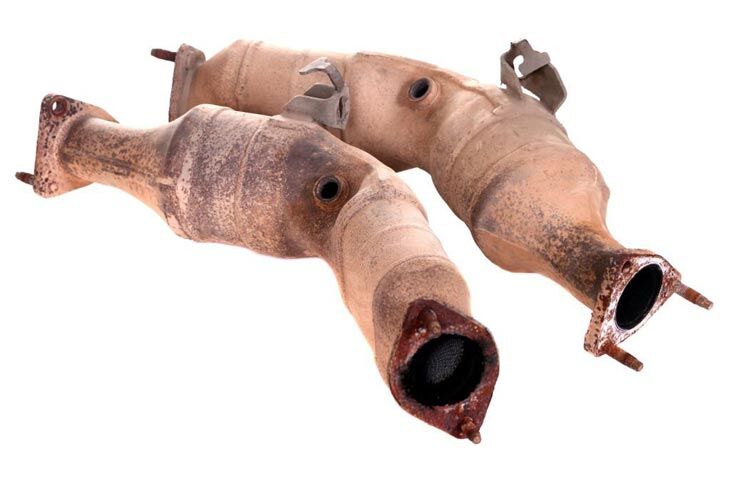Rotten Egg Smell In Car When Accelerating

The dreaded rotten egg smell permeating your car's cabin, especially during acceleration, is a telltale sign of a problem within your vehicle's emissions system. While unpleasant, understanding the root cause can help you address it swiftly and prevent further damage. This article will delve into the likely culprits, diagnostic steps, and potential solutions for this stinky situation.
The Sulfur Connection: Understanding the Source
The "rotten egg" odor is primarily due to the presence of hydrogen sulfide (H2S). This gas, a byproduct of the combustion process, is normally converted into odorless sulfur dioxide (SO2) by the catalytic converter. When the catalytic converter malfunctions or becomes overloaded, it's unable to efficiently process the H2S, leading to its escape into the exhaust stream and, eventually, into the passenger compartment, particularly noticeable during acceleration due to increased exhaust flow.
Common Culprits Behind the Offensive Odor
Several factors can contribute to a failing or overwhelmed catalytic converter:
- Faulty Catalytic Converter: This is the most frequent cause. The catalytic converter contains precious metals (platinum, palladium, and rhodium) that act as catalysts to facilitate chemical reactions. Over time, these catalysts can become contaminated or degrade, reducing the converter's efficiency.
- Overfueling: When the engine runs too rich (too much fuel, not enough air), excessive unburnt fuel enters the catalytic converter. This can overheat the converter, damaging its internal components and reducing its ability to convert H2S. Overfueling can stem from faulty oxygen sensors, malfunctioning fuel injectors, or a defective mass airflow (MAF) sensor.
- Contaminated Fuel: Low-quality fuel or fuel contaminated with sulfur can overload the catalytic converter and accelerate its degradation. Sulfur compounds in the fuel increase the amount of H2S produced during combustion.
- Engine Oil Leaks: If engine oil leaks into the combustion chamber (e.g., due to worn valve stem seals or piston rings), it can contaminate the catalytic converter and reduce its efficiency.
- Clogged or Damaged Exhaust System: Restrictions in the exhaust system, such as a collapsed muffler or a severely bent exhaust pipe, can create back pressure that stresses the catalytic converter.
Diagnosis: Pinpointing the Problem
A systematic approach is crucial for diagnosing the source of the rotten egg smell. Here's a step-by-step guide:
- OBD-II Scan: Use an OBD-II scanner to check for any diagnostic trouble codes (DTCs) related to the engine, fuel system, or catalytic converter. Codes like P0420 (Catalyst System Efficiency Below Threshold) are common indicators of a catalytic converter issue.
- Visual Inspection: Inspect the exhaust system for any signs of damage, leaks, or corrosion. Pay close attention to the catalytic converter itself.
- Fuel System Check: Evaluate the fuel injectors, oxygen sensors, and MAF sensor for proper function. A professional mechanic can perform tests to assess their performance and identify any malfunctions.
- Fuel Quality: Consider using a higher grade of fuel from a reputable source to rule out fuel contamination as a contributing factor.
- Exhaust Backpressure Test: A mechanic can use a pressure gauge to measure the exhaust backpressure. Excessive backpressure indicates a restriction in the exhaust system.
- Catalytic Converter Testing: Specialized equipment can be used to test the efficiency of the catalytic converter. This involves measuring the exhaust gas composition before and after the converter to determine its ability to convert pollutants.
Solutions: Eliminating the Stink
The solution depends on the underlying cause of the problem:
- Catalytic Converter Replacement: If the catalytic converter is faulty, replacement is often the only solution. Ensure you choose a high-quality replacement unit that meets the emissions standards for your vehicle.
- Fuel System Repair: Address any issues with the fuel injectors, oxygen sensors, or MAF sensor. Replacing faulty components will restore proper fuel mixture and prevent further damage to the catalytic converter.
- Exhaust System Repair: Repair or replace any damaged or clogged components in the exhaust system to restore proper flow.
- Engine Repair: If engine oil leaks are contaminating the catalytic converter, address the source of the leak, such as replacing worn valve stem seals or piston rings.
- Fuel Additives: In some cases, fuel additives designed to clean fuel injectors and remove sulfur deposits may help, but they are not a substitute for addressing underlying mechanical issues.
Ignoring the rotten egg smell can lead to further damage to your vehicle and potentially result in failing emissions tests. Addressing the issue promptly is crucial for maintaining your vehicle's performance and protecting the environment. Consult with a qualified mechanic to diagnose and resolve the problem effectively.
